- About Us
-
Who we are
-
- Publications
-
- ADPC Academy
-
MediaADPC'S NEWS
ADPC launches iCARE Innovations Fund ADPC launches iCARE Innovations Fund
26 Jul 2023
Bangkok, Thailand
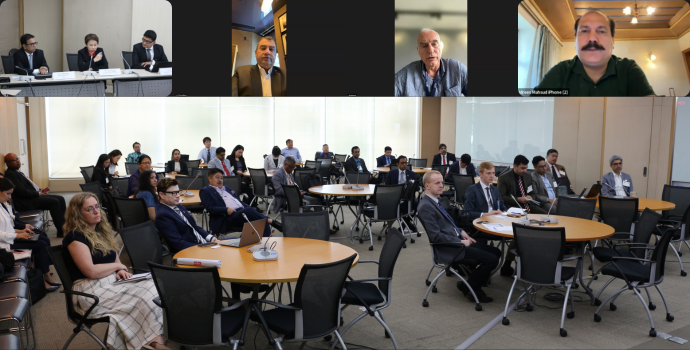
Over 100 participants, including government officials, United Nations agencies, civil society and non-government organizations, private sector, and innovators joined ADPC's hybrid side event on 'Targeting Transformative Adaptation for Riskier Times: Innovation in Climate Adaptation and Resilience in Asia' at UNESCAP's Fourth Disaster Week from 24-27 July 2023 in Bangkok, Thailand.
This side event provided a platform for UNESCAP Member States and ADPC's Regional Consultative Committee (RCC) Member Countries to deliberate on enabling factors and present priority areas for technical assistance on innovation and finance for transformative adaptation and resilience.
ADPC also launched the new phase of the Innovations in Climate Adaptation and Resilience (iCARE) Innovations Fund to foster climate resilience and adaptation innovations by facilitating transformative, affordable, and accessible climate solutions. Using and creating data and analytics will advance the South Asia Region's decision-support systems, guidelines, standards, innovation, and co-creation.
Its key themes include climate information and analytics, early warning systems for all, climate-smart agriculture, integrated water resources management, resilient infrastructure, and effective investments in climate adaptation. It is managed under ADPC's Climate Adaptation and Resilience (CARE) for South Asia project supported by the World Bank.
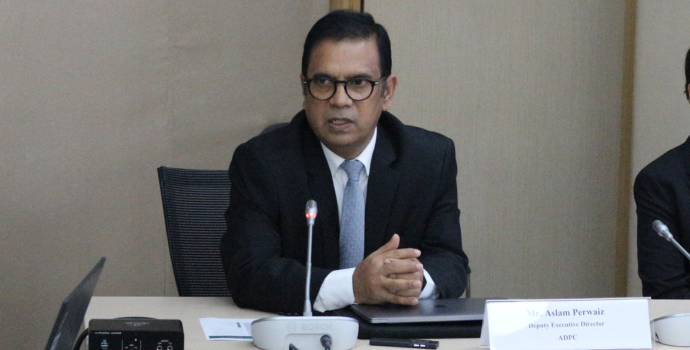
Mr. Aslam Perwaiz, Deputy Executive Director at ADPC, sharing his opening remarks.
Mr. Aslam Perwaiz, Deputy Executive Director at ADPC, welcomed all participants to the iCARE Launch in his opening remarks and spoke about the importance of promoting innovation.
"We at ADPC always believe that in order to enhance the resilience of communities, continuous innovation and using science and technology is really critical," he said, adding that innovative tools and approaches have been developed in the last few years in remote communities to connect people and address their day-to-day risks.
Mr. Perwaiz also recounted the success of a sub-granting mechanism under ADPC's CARE for South Asia project. "Twenty-one innovations were funded, and the lessons learned are that some of the innovations really had succeeded in terms of engagement of the end users, and we also have certain successes with some of the innovators now trying to up-scale in a larger geographical area in South Asia," he said.
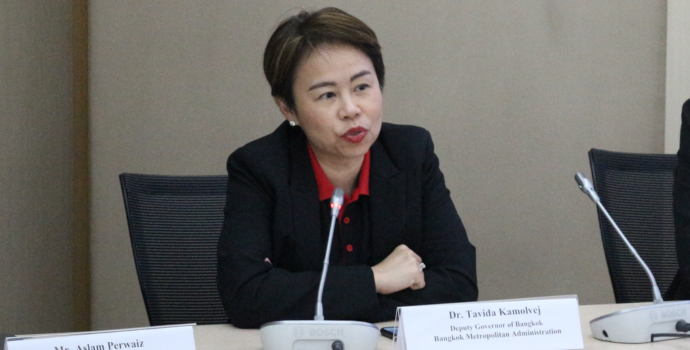
Dr. Tavida Kamolvej, Deputy Governor of Bangkok, Bangkok Metropolitan Administration, speaking at the iCARE Launch
Dr. Tavida Kamolvej, Deputy Governor of Bangkok, Bangkok Metropolitan Administration, shared specific examples of innovations in the city that are helping address climate change and build resilience.
One such innovation includes developing a spatial data map to identify areas most at-risk of flooding. "This is the very first time that Bangkok is actually having spatial data on risk management," she said, explaining that sensory systems have been installed in main streets in Bangkok to record precipitation, inundation, and air quality.
Dr. Tavida also spoke about the importance of reforms to encourage solar power production and distribution and the efficient use of green spaces. "Bangkok has a lot of land that is actually not used yet. If we could turn that into a green pocket park, it can work as a sponge that actually can absorb water," she suggested.
Other city-level initiatives that Dr. Tavida spoke about include using the Internet of Things in the city's electrical systems, supporting city authorities in exchanging data with each other, installing solar panel systems in hospitals, and the need to revise insurance culture.

Mr. Saber Hossain Chowdhury, Member of Parliament and Special Envoy on Environment and Climate Change to the Prime Minister of Bangladesh, speaking at the iCARE Launch.
Mr. Saber Hossain Chowdhury, Member of Parliament and Special Envoy on Environment and Climate Change to the Prime Minister of Bangladesh, suggested that there are natural limits to how much resources we can invest in resilience, so equal attention must also be given to mitigation and innovations.
"Bangladesh has been a pioneer when it comes to community-based resilience and adaptation," he said, adding that the Government of Bangladesh has a US $230 billion National Adaptation Plan to be implemented over the next 27 years.
Mr. Chowdhury also spoke about the importance of mobilizing financial resources in the public and private sectors for climate adaptation. "Adaptation cannot really be monetized, as with mitigation, there is no dollar return at the end yet," he said, adding that the Government of Bangladesh is identifying a pipeline of bankable projects.
Mr. Chowdhury also spoke about the importance of building capacities, collecting and analyzing real-time data, and having strategic foresight to build future-proof policies and maintain long-term resilience.
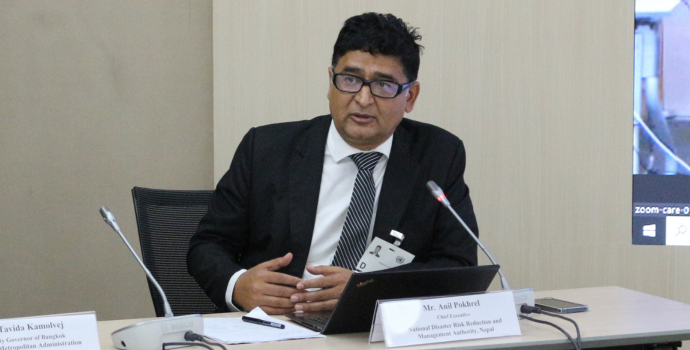
Mr. Anil Pokhrel, Chief Executive, National Disaster Risk Reduction and Management Authority (NDRRMA), Nepal, speaking at the iCARE Launch
Mr. Anil Pokhrel, Chief Executive, National Disaster Risk Reduction and Management Authority (NDRRMA), Nepal, spoke about multistakeholder coordination and the success of the country's BIPAD portal - an integrated and comprehensive disaster information management system that facilitates disaster communication and post-disaster event coordination in the country.
"We've been able to gather a lot of data around housing exposure, even down to a household level for close to two dozen municipalities in the country," he said, adding that the government, private sector, and academia regularly discuss new innovations and solutions.
Mr. Pokhrel also spoke about solar-powered audio early warning systems (with over 40 hotspot locations across the country) that can be operated by district and provincial emergency operations centers and how Nepal's private sector is moving toward more sustainable energy use and business practices.

Mr. Idrees Mahsud, Member (DRR), National Disaster Management Authority (NDMA), Pakistan, speaking at the iCARE Launch
Mr. Idrees Mahsud, Member (DRR), National Disaster Management Authority (NDMA), Pakistan, spoke about some climate innovations in Pakistan, such as investing in the Quaid-e-Azam Solar Park, one of the country's largest solar energy plants, as well as satellite-based water management system solutions.
Mr. Mahsud emphasized that governments must create an enabling environment for further innovations. "We need all policies, projects, and interventions to be climate-resilient, that are sensitive to climate change phenomena, and also disaster risk reduction-sensitive," he said, adding the importance of promoting public-private partnerships.
Mr. Mahsud also suggested that there is a further need for capacity building for communities, government agencies, and civil society, and he looks forward to learning more about future pilot innovations in Pakistan under iCARE.
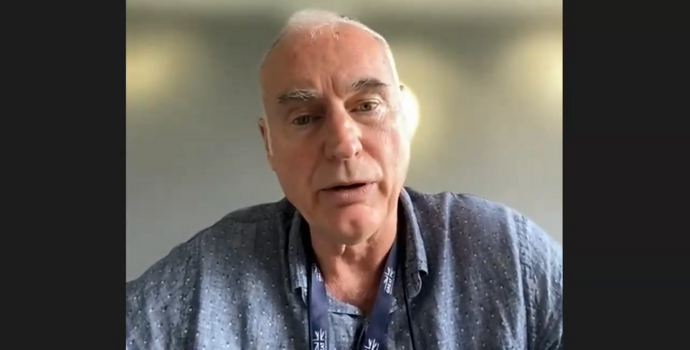
Mr. John Warburton, Head of Climate and Environment, Indo-Pacific Regional Department, at the Foreign, Commonwealth & Development Office (FCDO), speaking at the iCARE Launch
Mr. John Warburton, Head of Climate and Environment, Indo-Pacific Regional Department, at the Foreign, Commonwealth & Development Office (FCDO), Government of the United Kingdom, and Senior Climate and Environment Adviser, British High Commission in New Delhi, thanked all speakers for their insights and explained UK's plan to support climate adaptation and resilience.
"The UK is committed to spending £11.6 billion of international climate finance between our financial years of 2021-2026," he said, adding that it will be balanced between mitigation and adaption, and £3 billion of it will go towards solutions for restoring nature.
Mr. Warburton also explained how the Climate Innovation Challenge (CIC) – a sub-component of iCARE, helped launch a series of pilots in South Asia as part of FCDO's Asia Regional Resilience to a Changing Climate (ARRC) Program.
"The pilots brought in both efficiency and effectiveness as part of the approach to innovation. Improved efficiency was achieved by leveraging the strengths of established partnerships and programs outside of AARC," he said.
Mr. Warburton mentioned that a new program known as Climate Action for Resilient Asia (CARA) is a £274 million program for seven years to help build the resilience of economies and vulnerable communities to climate change, improve the natural environment, and promote low carbon growth across the Indo-Pacific. "We look forward to exploring how the CARA program and iCARE platform can collaborate as they both move forward," he added.
Latest NewsRelated Trainings
-